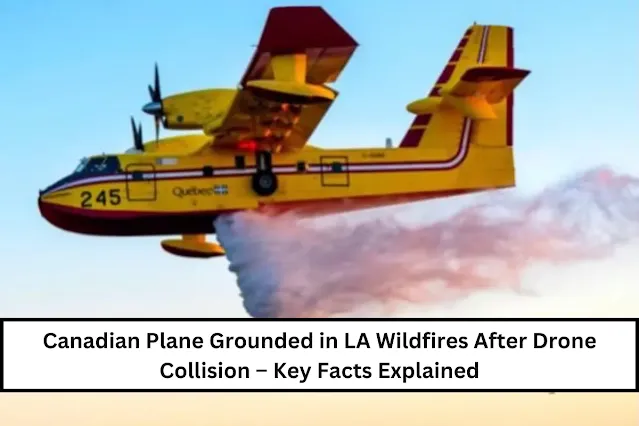A Canadian "Super Scooper" plane, which was helping fight the devastating wildfires in Los Angeles, has been grounded after a collision with a civilian drone. This incident has caused a serious disruption in the firefighting efforts and has raised questions about safety and the risks posed by drones around active wildfire zones.

What Happened to the Canadian 'Super Scooper' Plane?
The Canadian plane, a vital tool for fighting wildfires, was involved in an unexpected collision with a drone while working over the wildfire area. The Super Scooper, which is specially designed to scoop up water and drop it onto flames, was forced to land after the drone hit it. Fortunately, no one was injured, but the grounding of the plane has created delays in firefighting operations.
How Drones Are Disrupting Wildfire Control Efforts
Drones, while useful for various purposes, have become a serious threat to firefighting efforts. In this case, the civilian drone caused significant risk to both the plane and the safety of the firefighters on the ground. Drones flying in wildfire zones can interfere with aircraft, creating dangerous situations. Firefighting planes like the Super Scooper require clear skies to perform effectively, and the presence of drones complicates this.
Why Are Civilian Drones a Problem During Wildfires?
Civilian drones are not always aware of the dangers they pose to firefighting aircraft. While drones can offer aerial views of wildfires, their presence in active fire zones can be highly disruptive. This incident in Los Angeles highlights how the increasing use of drones in areas where emergency aircraft are operating can lead to hazardous situations.
What Actions Are Being Taken?
Authorities are investigating the collision and the role that the civilian drone played in grounding the firefighting plane. The drone operator may face penalties, and measures will likely be taken to prevent similar incidents in the future. Firefighters are urging the public to stay clear of wildfire zones with drones to ensure the safety of both the aircraft and the firefighters.
The grounding of the Canadian "Super Scooper" plane is a reminder of the need for strict control and regulations on drones, especially during emergencies like wildfires.
Drones can interfere with vital firefighting efforts, and ensuring safety in these situations is crucial. The event highlights the importance of respecting airspace regulations to prevent accidents and support the efforts of those working to contain and extinguish wildfires.
FAQs
1. Why was the Canadian "Super Scooper" plane grounded?
The plane was grounded after colliding with a civilian drone while fighting wildfires in Los Angeles. This caused a safety concern, requiring the plane to land.
2. How does a "Super Scooper" plane fight wildfires?
The "Super Scooper" is equipped to scoop water from nearby bodies of water and drop it onto the fire, helping to control the spread of flames.
3. Why are drones a problem for firefighting planes?
Drones can interfere with firefighting aircraft, creating dangerous situations for both the planes and the firefighters. They can disrupt the clear airspace needed for safe operations.
4. What are the risks of flying drones near wildfires?
Flying drones in wildfire zones can cause collisions with firefighting aircraft, delay emergency responses, and create serious safety risks.
5. What consequences might the drone operator face?
The drone operator could face legal action, including penalties, for flying in restricted areas and interfering with firefighting efforts.




0 Comments